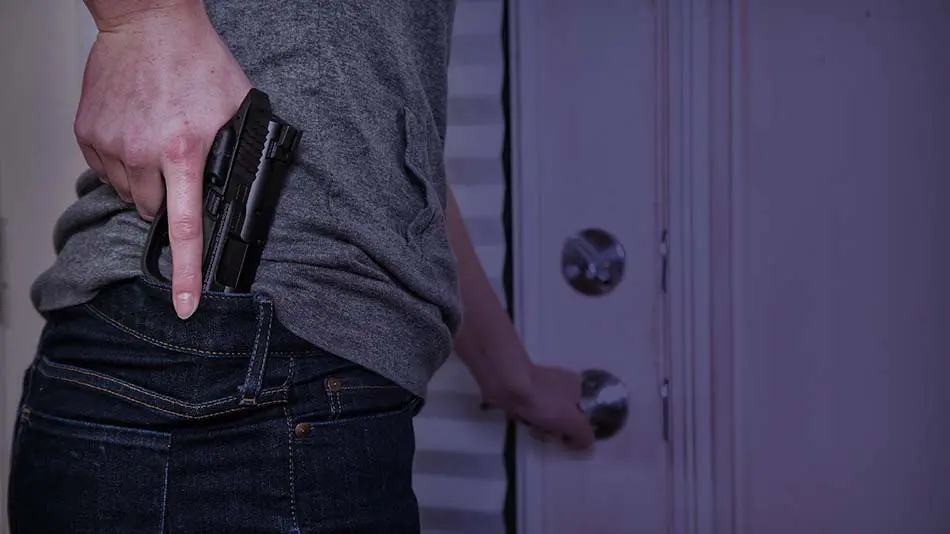You’re on an important work call when the doorbell rings. You motion for your 16-year-old son to find out who’s there and you step into the other room, closing the door behind you. Unbeknownst to you, it’s the police and they’re asking to search your home. Frightened, your son invites them in. Are they lawfully allowed to enter with your son’s permission? What if they don’t have a warrant?
The Fourth Amendment to the Constitution protects us from illegal searches and seizures. The rule is that law enforcement must have a warrant before they are allowed to search. However, there are many exceptions to this basic rule, which allow law enforcement to search without first obtaining a warrant. When it comes to your home, the most common exception is a police officer getting your consent to search.
A police officer can ask for consent to search you, your home, or your vehicle for no reason at all. There is no evidentiary standard required for an officer to ask for consent to search. The only requirement is that the officer obtain the consent voluntarily.
In Texas, what does “voluntarily” mean? Courts have determined that voluntariness means “more than a knowing choice.” The courts will look to see if the consent was voluntary by clear and convincing evidence. So, if an officer tells you he is going to search your home or else he is going to light your house on fire, that would not be voluntary.
Can You Say “No” to an Officer Asking to Search Your Home or Your Vehicle?
Absolutely, you can. You have no duty to allow an officer to search your home or vehicle. To give consent, you must have authority over the property in question, and you must also have an expectation of privacy in the place being searched. This means that as a passenger riding in your friend’s car with your friend, you would not have the proper authority to give consent to search the car. However, if your friend lets you borrow their car, and you were in control of the car at the time, then you would have authority to give consent.
What About Minors?
So, back to the example before, does your son have the authority to provide voluntary consent or to politely decline their request?
Potentially, your minor son could have the authority to provide consent or to politely decline the search. The individual who gives consent must exhibit sufficient discretion to freely, knowingly, and voluntarily consent to a search. When it comes to your minor son, a judge will look to see if the minor exhibited sufficient discretion to consent.
The law does not prohibit a minor child from consenting to the police entering when there is evidence to show that the officer’s belief in the minor’s authority to consent was reasonable. Limon v. State, 340 S.W.3d 753 (Tex. Crim. App. 2011). It seems clear that an officer would not think it was reasonable to get consent to search a home from a 10-year-old child. However, an officer may think a 16-year-old had sufficient discretion and authority to consent to a search.
What About Roommates?
What if, instead of a son (who happens to be a minor), you have a roommate or someone else living in your home, and they give the police consent? In Kutzner v. State, the court made it clear that a third party may properly consent to a search when they have control and authority to use the premises being searched. 994 S.W.2d 180 (Tex. Crim. App. 1999).
This means that your roommate would be able to give consent to search your house, but likely not your bedroom, unless the roommate has an expectation of privacy in your bedroom. But if you are both present at the time, then you both must give consent. If one of you gives consent and the other one does not, the consent is not valid. However, if a friend of yours who is simply visiting is the one who answers the door, they would not have the authority to give consent to search your home, since they do not have control over the property.
For any questions regarding searches or giving consent to search, call Texas LawShield and ask to speak to your Independent Program Attorney.
The preceding should not be construed as legal advice nor the creation of an attorney-client relationship. This is not an endorsement or solicitation for any service. Your situation may be different, so please contact your attorney regarding your specific circumstances. Because the laws, judges, juries, and prosecutors vary from location to location, similar or even identical facts and circumstances to those described in this presentation may result in significantly different legal outcomes. This presentation is by no means a guarantee or promise of any particular legal outcome, positive, negative, or otherwise.





I have an elderly mother-in-law that lives with my wife and I that we are caring for. She is very bad about answering the door when we are not at home and, at the risk of sounding rude, is not the sharpest knife in the drawer. We would like to know if her consent would be considered valid if we are not home since she does live here and is not a “renter”.
To give consent, you must have authority over the property in question,
The law does not prohibit a minor child from consenting to the police entering when there is evidence to show that the officer’s belief in the minor’s authority to consent was reasonable. Limon v. State, 340 S.W.3d 753 (Tex. Crim. App. 2011). It seems clear that an officer would not think it was reasonable to get consent to search a home from a 10-year-old child. However, an officer may think a 16-year-old had sufficient discretion and authority to consent to a search.
Ok, here’s the question. If anyone other than the leagle owner or person whos name is on the motgage payment opens the door, how can they give consent to search? They don’t have authority over the property.